|
|
|
Sort Order |
|
|
|
Items / Page
|
|
|
|
|
|
|
| Srl | Item |
| 1 |
ID:
168831
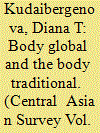

|
|
|
|
|
| Summary/Abstract |
What is the power of social media in defining and policing sexual identities and bodily expressions, and what are their connections to understanding nation, power and self in authoritarian contexts? Through the study of popular Instagram accounts in Kazakhstan and Russia, I argue that these sites serve as spaces of visualization and re-creation of new forms of ‘acceptable’ behaviour and lifestyles, that on the one hand may lead to new globalized visions of sexual identity and the body while on the other promoting localized conflict and resentment online, triggered by online users’ fear of losing their ‘national culture’ in these global trends. While many resort to policing gender norms and heteronormative body images online, influencers and Instagrammers from Russia and Kazakhstan take an active part in resisting these frameworks and categories.
|
|
|
|
|
|
|
|
|
|
|
|
|
|
|
|
| 2 |
ID:
180003
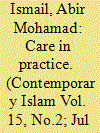

|
|
|
|
|
| Summary/Abstract |
Recent studies conclude that ethnic minority families in Denmark tend to be dismissive of senior housing and municipal homecare services for elderly family members. A large proportion of Muslim minority families in Denmark attach great importance to caring for the elderly as a tradition and prefer to take care of their own elderly family members at home. Nevertheless, the fact that morality, incentives, and obligations in relation to care for the elderly may be legitimized and/or contested with reference to cultural traditions and Islam has not received much attention in current research. In this article, drawing on material from ongoing ethnographic fieldwork among Arab Muslim families in Denmark, I discuss how cultural and religious backgrounds may determine and influence perceptions and behavior regarding care for the elderly. By observing and engaging in the everyday life of an Arab Muslim family, I explore how caring for elderly people with health problems at home raises specific questions about obligations and triggers negotiations across genders and generations. I argue that besides kinship and ethnicity, it is equally important to consider religiosity in an attempt to learn more about how Arab Muslims care for their elderly family members.
|
|
|
|
|
|
|
|
|
|
|
|
|
|
|
|
| 3 |
ID:
174380
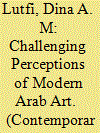

|
|
|
|
|
| Summary/Abstract |
The understanding of modern Arab art is, more often than not, based on individual and collective perceptions that relate to beliefs, culture, and social constructs. Defining qualities or characteristics that make a work of art “Arab” is not a clear-cut endeavor. Many Arab artists appropriated Western techniques, while they strived to combine their newly acquired artistic processes with content inherent in their respective cultures. Some audiences appreciated the new direction the Arab art was taking; however, many artists were harshly criticized of advocating cultural colonialism. A struggle in the field of art, and in other aspects of life took place, due to the increasing fear of losing one’s own tradition and Arab identity in the face of Western culture. This article explores the nature of modern Arab art and Arab identity, its place within a global modernism, and the ways in which Western influences have shaped its development, in addition to understanding the different particularities that have shaped Arab modernism in art specifically.
|
|
|
|
|
|
|
|
|
|
|
|
|
|
|
|
| 4 |
ID:
149924


|
|
|
|
|
| Summary/Abstract |
North western NSW has seen a host of interest groups working in alliance opposing coal and coal seam gas mining. These groups - farmers, residents and environmentalists share concerns about the impact on the unique black soil and aquifer, of fossil fuel more broadly. While these shared alliances across class, gender and generations are emergent, Aboriginal citizens are uniquely placed in this contest over land, environment and resources. This paper sets out to show the historical and contemporary significance of the place of Aboriginal people in the debate over land use, arguing that, for the first time in history, Aboriginal worlds are central to community futures. In this space, new relationships are being forged and new discourse is required to comprehend the complex position Aboriginal citizens have as custodians of place and at the same time, the responsibility to provide for families and communities, otherwise excluded from the prevailing modern economy. With reference to the history of both relationship to land and land usage over Gomeroi country, and drawing on ethnographic along with archival research, this article seeks to contribute to a critical understanding of Aboriginal people's dealings in relation to their land, their cultural and economic interests with in an emerging regional coal economy, and in turn how they are redefining the context for energy resource extraction, and energy policy.
|
|
|
|
|
|
|
|
|
|
|
|
|
|
|
|
| 5 |
ID:
105591
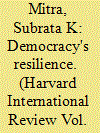

|
|
|
| 6 |
ID:
067261
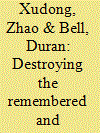

|
|
|
| 7 |
ID:
079533
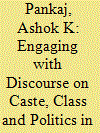

|
|
|
|
|
| Publication |
2007.
|
| Summary/Abstract |
This article maps the changing profile of pre-Mandal and post-Mandal debates on caste, class and politics in India, showing that the centrality of caste as an agent of politics and its dominant role in public-political life has remained a reality throughout. What is contested now is the extent to which recognition of caste as an instrument of socio-political change (following the Mandal Commission) and caste-centric socio-political movements of the 1980s and 1990s (the Dalit and Backward Class movements) has reinforced caste-centric public-political life by giving it a modern value and a secular purpose.
The article argues that the contemporary elaborate discourses on caste, class, and politics in India should seek to develop new paradigms for the discussion of caste and should interrogate more vigorously the democratic and secular roles of caste in relation to class and politics
|
|
|
|
|
|
|
|
|
|
|
|
|
|
|
|
| 8 |
ID:
133272
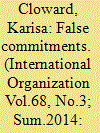

|
|
|
|
|
| Publication |
2014.
|
| Summary/Abstract |
A substantial international relations literature addresses the various ways in which international actors, and the norms they promote, influence state behavior. But less attention has been paid to the influence these actors directly exert at the local level, despite the fact that many transnational campaigns promote norms for which individuals-not states-are the primary transgressors. If individuals behave as some states do, publicly embracing international norms only because they expect a financial or reputational benefit from doing so, then the campaigns have not fully succeeded. But when do individuals engage in real behavior change, and when do they simply change the public image they present to the international community? To begin to address this question, I employ a randomized field experiment to evaluate individuals' willingness to make claims that differ from their true normative commitments. I conducted the experiment in the context of an original 2008 opinion survey about female genital mutilation and early marriage, run in rural Kenya. I find that respondents misrepresent their behavior and intentions, and I supplement these findings with an exploration of causal mechanisms through qualitative interviews.
|
|
|
|
|
|
|
|
|
|
|
|
|
|
|
|
| 9 |
ID:
111517


|
|
|
|
|
| Publication |
2012.
|
| Summary/Abstract |
Through a brief history of a widely published canon debate in nineteenth century Orissa, this article describes how anxieties about the quality of 'traditional' Oriya literature served as a site for imagining a cohesive Oriya public who would become the consumers and beneficiaries of a new, modernized Oriya-language canon. A public controversy about the status of Oriya literature was initiated in the 1890s with the publication of a serialized critique of the works of Upendra Bhanja, a very popular pre-colonial Oriya poet. The critic argued that Bhanja's writing was not true poetry, that it did not speak to the contemporary era, and that it featured embarrassingly detailed discussions of obscene material. By unpacking the terms of this criticism and Oriya responses to it, I reveal how at the heart of these discussions were concerns about community building that presupposed a new kind of readership of literature in the Oriya language. Ultimately, this article offers a longer, regional history to the emerging concern of post-colonial scholarship with relationships between publication histories, readerships, and broader ideas of community - local, Indian, and global.
|
|
|
|
|
|
|
|
|
|
|
|
|
|
|
|
| 10 |
ID:
168216
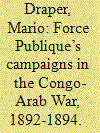

|
|
|
|
|
| Summary/Abstract |
Between 1892 and 1894 the Force Publique of King Leopold II’s Congo Free State engaged in a series of little-known counter-insurgency operations against ivory and slave traders from Zanzibar, commonly referred to as Arabs. Without a particularly strong tradition of imperial service, this article argues that the predominantly Belgian officer corps borrowed and adapted methods used by more experienced colonial forces in the 19th Century. Whether taken from existing literature or learned through experience, it reveals that the Force Publique’s counter-insurgency methods reflected many of the more recognisable aspects of traditional French and British approaches. It suggests that, despite the unique nature of each colonial campaign, basic principles could be adapted by whomsoever to overcome the military and political challenges of colonial conquest. The Force Publique’s campaigns in the Congo-Arab War, therefore, provide further evidence as to how some base theories could be universally applied.
|
|
|
|
|
|
|
|
|
|
|
|
|
|
|
|
| 11 |
ID:
176032
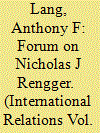

|
|
|
|
|
| Summary/Abstract |
This piece introduces the Forum on Nicholas J Rengger by focusing on Rengger’s humanist approach to the study of International Relations. It reviews his understanding of theory, tradition, order and war. It locates the contributors’ work in relation to these themes.
|
|
|
|
|
|
|
|
|
|
|
|
|
|
|
|
| 12 |
ID:
033225
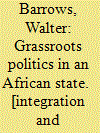

|
|
|
|
|
| Publication |
New York, African Publishing Co., 1976.
|
| Description |
vii, 265p.Hbk
|
| Standard Number |
086490183X
|
|
|
|
|
|
|
|
|
|
|
|
Copies: C:1/I:0,R:0,Q:0
Circulation
| Accession# | Call# | Current Location | Status | Policy | Location |
| 016722 | 320.9664/BAR 016722 | Main | On Shelf | General | |
|
|
|
|
| 13 |
ID:
161696
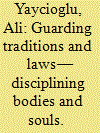

|
|
|
|
|
| Summary/Abstract |
This article examines the religious and intellectual dynamics behind the Ottoman military reform movement, known as the New Order, in the late eighteenth and early nineteenth centuries. Conventionally, the New Order has been examined within the framework of the Westernization of Ottoman military and administrative institutions. The Janissary-led popular opposition to the New Order, on the other hand, has been understood as a conservative resistance, fashioned by Muslim anti-Westernization. This article challenges this assumption, based on a binary between Westernization reforms versus Islamic conservatism. It argues that the Janissary-led popular opposition, which was consolidated long before the New Order, developed as a form of resistance by antinomian elements blocking the top-down disciplinary policies of the central state throughout the seventeenth and eighteenth centuries. The New Order programme, which was unleashed in 1792, was also opposed by the Janissary-led coalition, on the basis that it would wipe out vested privileges and traditions. Supporting the New Order, we see a coalition and different intellectual trends, including: (i) the Euro-Ottoman military enlightenment, led by military engineers and scientists, which developed an agenda to reorganize and discipline the social-military order with universal principles of military engineering and (ii) Islamic puritan activism, which developed an agenda to rejuvenate the Muslim order by eliminating invented traditions, and to discipline Muslim souls with the universal principles of revelation and reason. While the Euro-Ottoman military enlightenment participated in military reform movements in Europe, Islamic activism was part of a trans-Islamic Naqshibandi-Mujaddidi network originating in India. We thus witness a discursive alliance between military enlightenment and Muslim activism, both of which had trans-Ottoman connections, against a Janissary-led popular movement, which mobilized resistance to protect local conventions and traditions.
|
|
|
|
|
|
|
|
|
|
|
|
|
|
|
|
| 14 |
ID:
159384
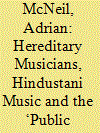

|
|
|
|
|
| Summary/Abstract |
In the late nineteenth century, Hindustani music and its culture arrived in Calcutta's public sphere. It was carried there as much through the migration and agency of the professional lives of the ‘ustads from the North’ as it was through the forces of coloniality, modernity and Hindu nationalism. On its arrival, the performance practice and social organisation of Hindustani music culture came face to face with the bustle of social and cultural experimentation and innovation that came to define the ‘Bengal Renaissance’. Hindustani music was certainly not isolated from this larger cultural dynamic and, over four or five decades, its practitioners were compelled to formulate a series of responses in order to negotiate the challenges which this public sphere posed to past practices of this tradition transplanted from North India to Bengal. Their responses bring into focus a number of significant issues: firstly, the nature of these responses and the consequences they had for the development of Hindustani music and its culture; secondly, the issue of the discourse of ‘modern’ Hindustani music that arose from this encounter; and thirdly, questions over whose voice(s) were represented and whose voice(s) were marginalised in the process. Finally, there is the issue of how these responses still resonate in Hindustani music practice today, as they continue to reside in and frame the contemporary musical imagination.
|
|
|
|
|
|
|
|
|
|
|
|
|
|
|
|
| 15 |
ID:
100398
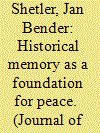

|
|
|
|
|
| Publication |
2010.
|
| Summary/Abstract |
While ethnic identity formulated by historical memory is often understood as the cause of violent conflict in Africa, this qualitative historical study of interethnic relations between Luo and Bantu-speaking communities on the borderlands of Tanzania and western Kenya demonstrates just the opposite. In fact, migration and violent conflicts over land in the late 19th century were the basis for oral traditions that established new microethnic identities. It was only in the colonial era that the modern macroethnicities of Luo and Suba (Bantu), as rigid oppositional identities, began to solidify around land disputes. Historical memory constructs these dynamic microethnic identities around interethnic reciprocal networks that were necessary for gaining security and access to land in the past. During these late 19th-century conflicts, interethnic alliances and marriages were the norm, resulting in many Bantu-speaking communities becoming Luo, to one degree or another. Historical memory, as the central tool for constructing ethnicity, can be used to promote either violence or peace, depending on how it is deployed. In western Kenya, an oppositional Luo identity resulted from the colonial construction of macroethnicity, while in North Mara, Tanzania, a different national narrative has resulted in relative peace. In his collection of oral traditions from North Mara, Zedekia Oloo Siso makes a case for these still salient microethnicities, based on regional networks that cross-cut ethnic boundaries, as the indigenous networks necessary for peace.
|
|
|
|
|
|
|
|
|
|
|
|
|
|
|
|
| 16 |
ID:
140378
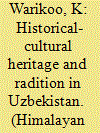

|
|
|
| 17 |
ID:
164060
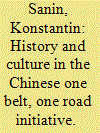

|
|
|
|
|
| Summary/Abstract |
The One Belt, One Road initiative has become a very important contribution of the fifth generation of PRC leaders to the development of China's foreign policy, which has determined the vector of the country's relations with its neighbor countries for the foreseeable future. The Chinese authorities regard this initiative as a principally new phenomenon in world politics, pointing to its direct connection with the historical practice of cooperation in the vast area of the Silk Road and a traditional Chinese approach to relations with its neighbors.
|
|
|
|
|
|
|
|
|
|
|
|
|
|
|
|
| 18 |
ID:
141450
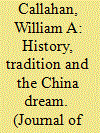

|
|
|
|
|
| Summary/Abstract |
How will China influence world politics in the twenty-first century? Many people answer this question by looking to Chinese history, and particularly to traditional models of Chinese world order. This essay seeks to complicate this question by asking which history, and which tradition? While it is common to look at China's pre-modern history as ‘tradition’, this essay argues that we also need to appreciate how ‘socialism’ is treated as a tradition alongside Chinese civilization. It does this by examining how China's public intellectuals appeal to two seemingly odd sources: Mao Zedong's 1956 speech ‘Strengthen Party Unity and Carry Forward Party Traditions’, and the ‘Great Harmony’ passage from the two millennia-old Book of Rites. It will argue that these two passages are employed as a way of salvaging socialism; the ideological transition thus is not from communism to nationalism, but to a curious combination of socialism and Chinese civilization. This new socialist/civilization dynamic integrates equality and hierarchy into a new form of statism, which is involved in a global competition of social models. Or to put it another way, what these two passages have in common is not necessarily a positive ideal, but a common enemy: liberalism, the West and the United States.
|
|
|
|
|
|
|
|
|
|
|
|
|
|
|
|
| 19 |
ID:
154942
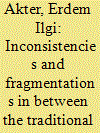

|
|
|
|
|
| Summary/Abstract |
This paper addresses the paradoxes and challenges faced by tasavvuf musicians as they engage with the ‘field of tradition’ in Turkey. It shows the incoherent nature of this field and how the conservative cultural turn since the early 2000s contributes to its fragmentation. This period is particularly relevant, as it is considered a period of traditionalization, when society became more exposed to a new, traditionalized culture industry. Hence, the paper suggests that tasavvuf music, emically labeled as ‘tradition’, has been integrated into the period of traditionalization; yet, its practitioners show inconsistences and conflicting discourses in their relation with the traditionalization.
|
|
|
|
|
|
|
|
|
|
|
|
|
|
|
|
| 20 |
ID:
124975
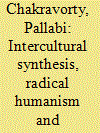

|
|
|
|
|
| Publication |
2013.
|
| Summary/Abstract |
Rabindranath Tagore imbued Indian dance and music with a new modern sensibility. He created novel and eclectic dance-and-music genres, Rabindranritya and Rabindrasangeet, when the national trend was toward classical revivalism. He inspired Indian women to dance on the national stage at a time when dance was associated with immorality and cultural degeneration. This article explores Tagore's song and dance creations, connecting them to his radical political and philosophical thought on universal humanism. Focusing on his views on creativity and freedom, nationalism and cosmopolitanism, and women and essentialism, it is argued that this eclectic intercultural synthesis of ideas served to promote individual consciousness, empowerment and cosmopolitanism without rejecting their Indic cultural roots.
|
|
|
|
|
|
|
|
|
|
|
|
|
|
|
|
|
|
|
|
|